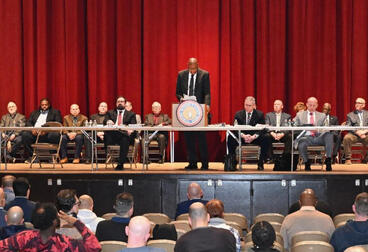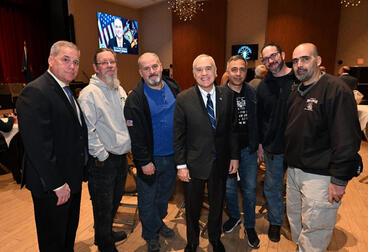Members of the trade union movement assess climate change symposium at CUNY‰Ûªs Murphy Institute.
Local 3 and the Joint Industry Board were well represented at the “Climate Leadership Immersion for Union Officers and Staff,” held recently at the CUNY Murphy Institute. å_
Local 3 Treasurer and Associate Director of the Educational and Cultural Trust Fund of the JIB Michael Yee, Local 3 Business Representative Christopher Erikson Jr, Local 3 rank and file member Bobby Holst and JIB Educational Program Director Dr. Partha Banerjee joined 30 other participants from nine different unions for the 3-day educational immersion on climate change. The program was a chance for the participants to better understand the science behind climate change, learn more about the UN climate talks over the past 30 years, discuss legislation and other potential solutions surrounding climate change and analyze the US labor movement’s role thus far in the climate crisis. Local 3 has a reputation in the labor movement as a progressive union and its participation in the Climate Immersion was appreciated immensely.
While the climate crisis has slowly gotten worse over the past two decades, the earth is reaching a critical point in its ability to sustain itself for the foreseeable future. The evidence is apparent, so much that 97% of climate scientists agree humans are causing global warming. The main factors that are causing the global warming and the climate crisis are increased carbon dioxide emissions and the greenhouse gas effect, mainly through energy use, with the energy sector providing a quarter of global emissions. The main pieces of evidence in the climate crisis are global warming and increasing temperatures, the rise in sea levels, shrinking ice sheets, melting Arctic sea ice and extreme weather events that have increased in both severity and frequency. Unfortunately, many Local 3 members know the reality of extreme weather events, having lived through and rebuilt after Superstorm Sandy.
What needs to be clear are the major impacts of the climate crisis. These impacts affect the earth’s physical, natural and biological systems. A number of health issues are due to the climate crisis and increased levels of air pollution, such as increased cases of asthma, the spread of infectious diseases connected to hot weather and droughts and deaths from natural disasters and prolonged heat waves. In New York State alone, the health costs due to fossil fuel air pollution is $33 billion per year. Agriculture and global food security are affected as global temperatures increase. Coastal cities, seaboards and some island nations are in danger of disappearing due to rising sea levels. All of these impacts affect people as well, leading to increased numbers of migration and social unrest and entire groups try to find new places to live and new ways to survive due to the climate crisis.
The recent Paris Climate Agreement made some small amount of headway in addressing the climate crisis globally, however, many scientists and climate justice activists agree that it is nowhere near enough. While there were more countries participating than ever before and acknowledgement that the global temperature rise must be kept “well below 2 degrees Celsius,” the commitments of the agreement were not consistent with the scientific evidence, nor the commitments legally binding.
The roles of both the global and US labor movements in the climate crisis were discussed heavily throughout the Immersion. Fighting climate change was framed as a social and political struggle. The market-based solutions of corporate America towards solving the climate crisis have not worked. Therefore, the Immersion focused on building power through alliances with Labor as a strategic partner in order to unite working people around the major issue of climate justice in order to ensure a sustainable future for generations to come. While attempts at national and local legislation, regulations and policies have attempted to address this issue, none have truly put working people at the core of the solution. The answer is not to shut down all the coal-fired power plants, but to analyze the use of electricity and transportation, to transition to new forms of renewable energy and to make sure the working people who may no longer work at the power plant are considered and trained to build and install solar panels, smartmeters and wind turbines.
Local 3 has focused on this issue of å_climate change and has taken a strong position in addressing the crisis. Local 3 Business Manager Christopher Erikson is a member of the global initiative called Trade Unions for Energy Democracy, whose effort is on creating democratic control of energy that works towards solving the climate crisis while focusing on workers and workers’ rights. Erikson also addressed the Labor Contingent at the Peoples Climate March in September 2014 in New York City, where over 400,000 people took to the streets and made their voices heard about the need to address and solve the climate crisis. It is imperative to take this issue and frame it economicallyåÊ about the need for good union Green jobs on a sustainable planet. The future of our world is at stake and it is an unprecedented opportunity to rally together and solve the climate crisis while raising the well-being of an entire generation of workers.

